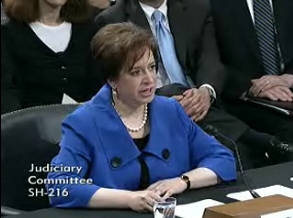GOP Opens Its Offense Against Kagan’s Political Stances, Military Recruitment and Legal Heroes

Elena Kagan during her introductory statement.
Screen shot from Senate Judiciary Committee
live webcast.
Republicans on the Senate Judiciary Committee have finished their opening statements and their themes have become clear: Elena Kagan has been more political activist than legal thinker, she was hostile to military recruiting at Harvard, and she has had questionable legal heroes, such as Judge Aharon Barak of Israel.
(The members are alternating by party, but there are, of course, more Democrats than Republicans.)
Sen. Jon Kyl, Republican of Arizona, questioned why the American Bar Association would give Kagan its highest rating—well qualified—when Kagan does not appear to meet the ABA’s requirement that such a rating requires at least 12 years of experience in the practice of law.
Kyl also tread into what some political observers say is potentially dangerous territory by raising Kagan’s links to Justice Thurgood Marshall, saying that Kagan “wrote a tribute to Justice Marshall in which she said in his view it was the role of the courts and interpreting the Constitution to protect the people who went unprotected by every other organ of government. The court existed primarily to fulfill this mission. And later, when she was working in the Clinton administration, she encouraged a colleague working on a speech about Justice Marshall to emphasize his unshakable determination to protect the underdog.”
Sen. John Cornyn, R-Texas, told Kagan that because she has never been a judge, “what we do know about you begins, and largely ends, with your resumé. We know you were a law clerk to two federal judges, and we know you served in the Clinton administration as an adviser on many hot-button political questions, including abortion, gun rights, and affirmative action.”
“We also know that you have spoken about your judicial heroes,” Cornyn continued. “One hero is Justice Thurgood Marshall, for whom you served a law clerk. Thurgood Marshall, of course, was a famous lawyer for, among other cases, having won the landmark civil rights case Brown v. Board of Education. But from his self-described judicial philosophy and his performance on the bench, it is clear that Justice Marshall was a judicial activist as I have described that phrase earlier. Thurgood Marshall described his judicial philosophy as ‘do what you think is right and let the law catch up.’ ”
It’s not clear how far the Republicans want to take this line, but it prompted a response from Sen. Richard Durbin, D-Ill., a committee member and the Senate majority whip. “America is a better nation because of the tenacity, judiciary and the integrity and values of Thurgood Marshall,” Sen. Durbin said, adding that Marshall, for whom Kagan clerked in 1987-88, broke down “barriers of racial discrimination that haunted Americans for generations.”
Though it doesn’t quite rank with a comment on the first day of the hearings last year, by Sen. Lindsey Graham, R-S.C., that he would likely vote to confirm Sonia Sotomayor, a comment from Sen. Orrin G. Hatch, R-Utah, seemed to betray the inevitable.
“Something tells me this is likely your last confirmation hearing,” Sen. Hatch told Kagan.
Also see these posts today from ABAJournal.com:
Busy Morning at the High Court; Big Decisions, Farewells and Scrutiny of the Court’s Latest Nominee
Senators Begin Opening Statements at Kagan Confirmation Hearing



